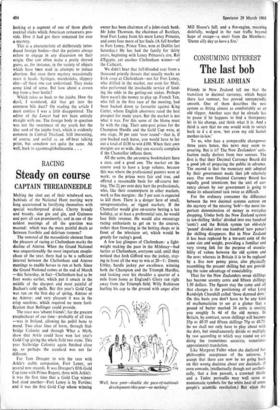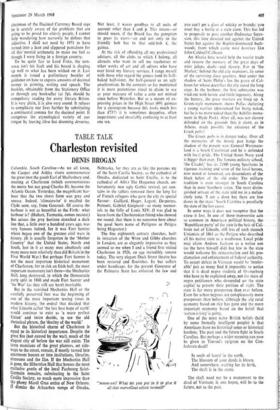The last bob
CONSUMING INTEREST LESLIE ADRIAN
Friends in New Zealand tell me that the transition to decimal currency, which began there last summer, has proved unexpectedly smooth. One of them describes the new system as fitting almost as comfortably as an old slipper. Another says that he already has to pause if he happens to find a threepenny bit in his change, and think what it is. And a third is sure that no one would wish to switch back to f s d now, 'not even my old Scotch mother-in-law.'
To us, who face a comparable changeover • three years hence, this news may seem re- assuring. But is it? The New Zealanders' satis- faction really derives from two sources. The first is that their Decimal Currency Board did a good job of preparing the public in advance. The second is that the monetary unit adopted by their government made that job relatively. easy. Our own Decimal Currency Board has equally good intentiong, but the unit of cur- rency chosen by our government is going to make its educational task twice as difficult For the ordinary consumer the difference between the two decimal systems centres on the mystery of the missing 'bob'—the most im- portant denomination of money in everyday shopping. Under both the New Zealand system (a ten-shilling 'dollar' divided into one hundred `cents') and the British system (an old-style 'pound' divided into one hundred 'new pence') the shilling disappears. But in New Zealand it has been replaced by a ten-cent coin of the same size and weight, providing a familiar and very strong link for the purpose of associa- bility of values between the old system and the new; whereas in Britain it is to be replaced by a five new penny piece, also physically resembling the present shilling but not provid- ing the same advantage of associability.
Thu l for the New Zealanders seven shillings has become seventy cents and fifteen shillings 1.50 dollars. The figures stay the same and all that changes is the positioning of what Lord Randolph Churchill called `those damned dots.' On this basis you don't have to be any kind of mathematician to see at a glance that a pound of butter marked 34 cents is costing you roughly 3s 4d of the old money. In Britain, by contrast, seven shillings will become 35p or £0.35 and fifteen shillings 75p or £0.75. So we shall not only have to play about with the dots, but simultaneously divide or multiply by two according to which way round we are doing the (sometimes accurate, sometimes approximate) translation. Like Margaret Fuller when she declared her philosophic acceptance of the universe, I accept that there can now be no going back on this wrong decision about our decimals. (I even concede, intellectually though not aestheti- cally, that a lion passant, a crowned thistle and a Tudor portcullis may well serve as numismatic symbols for the white heat of some people's scientific revolution.) But when the chairman of the Decimal Currency Board says he is acutely aware of the problems that are going to be posed for elderly people, I cannot help wondering how narrowly he defines that adjective. I shall not need by 1971 to have turned into a lean and slippered pantaloon for all this' mental arithmetic to make me feel as though I were living in a foreign country.
To be quite fair to Lord Fiske, the non- sense isn't his fault and his board is shaping up well to what has been wished on it. Last month it issued a preliminary booklet of guidance on how to express amounts of decimal money in printing, writing and speech. The booklet, obtainable from the Stationery Office or through any bookseller (at 5p), should be compulsory reading for every literate Briton. It is very plain, it is also very sound. It refuses to complicate our lives further by substituting a continental comma for the decimal point. It recognises the etymological variety of our tongue by leaving Libra but dooming denarius. Not least, it waves goodbye to all units of account other than £ and p. This means—or should mean, if the Board has the gumption to press its views—an end not only to the friendly bob but to that odd-bob f, the guinea.
At the risk of offending all my professional advisers, all the clubs to which I belong, all altrusits who want to sell me racehorses or other works of art and all editors who have ever hired my literary services, I range myself with those who regard the guinea (and its half- baked half-sister, the half-guinea) as an ugly anachronism. In the contexts so far mentioned it is mere pretentious ritual to claim to use as your measure of value a coin not minted since before Waterloo. But as a means of ex- pressing prices in the High Street (69+ guineas for a stereogram because this looks much less than £73?) it is sometimes deceptive, often impertinent and invariably confusing to at least one sex.







































 Previous page
Previous page